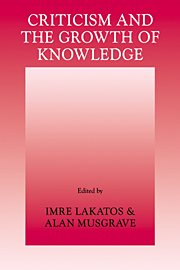 Criticism and the Growth of Knowledge
Criticism and the Growth of Knowledge Book contents
- Frontmatter
- Contents
- Preface
- Note on the Third Impression
- Logic of Discovery or Psychology of Research?
- Against ‘Normal Science’
- Does the Distinction between Normal and Revolutionary Science Hold Water?
- Normal Science, Scientific Revolutions and the History of Science
- Normal Science and its Dangers
- The Nature of a Paradigm
- Falsification and the Methodology of Scientific Research Programmes
- Consolations for the Specialist
- Reflections on my Critics
- Index
- References
Against ‘Normal Science’
Published online by Cambridge University Press: 05 August 2014
- Frontmatter
- Contents
- Preface
- Note on the Third Impression
- Logic of Discovery or Psychology of Research?
- Against ‘Normal Science’
- Does the Distinction between Normal and Revolutionary Science Hold Water?
- Normal Science, Scientific Revolutions and the History of Science
- Normal Science and its Dangers
- The Nature of a Paradigm
- Falsification and the Methodology of Scientific Research Programmes
- Consolations for the Specialist
- Reflections on my Critics
- Index
- References
Summary
I
A few weeks ago I was asked to reply to Professor Kuhn this afternoon. Feyerabend and Lakatos were to have given the other papers; but the first could not come and the second found that, in arranging this colloquium, he had brought into existence a many-headed monster attending to whose multiplying demands would keep him busy approximately twentyfour hours a day.
This unexpected invitation made me very happy. Kuhn enjoys a unique position in the English speaking world as a philosophically-minded historian and historically-minded philosopher of science. I felt that it would be a privilege and a pleasure to reply to his paper.
For Kuhn, however, the programme change was not so agreeable. He had expected that Feyerabend and Lakatos would write independent papers so that his own would not need to be ready until this afternoon. Now he found that I was to reply to his paper, which rather suggested that I should see it beforehand. He responded heroically, rushing bits of his paper across the Atlantic as they left his typewriter. During much of last week I felt like a reader of a cliff-hanging serial, eagerly awaiting the next instalment. Thus my own paper has been written in a rush; and this has, I fear, aggravated my tendency to wave aside details and qualifications in trying to come to grips with someone's ideas.
- Type
- Chapter
- Information
- Criticism and the Growth of KnowledgeProceedings of the International Colloquium in the Philosophy of Science, London, 1965, pp. 25 - 38Publisher: Cambridge University PressPrint publication year: 1970
References
- 85
- Cited by
